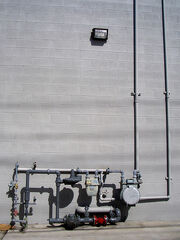
external pipes
Pipe carries water to, from and within our homes. The water can be clean and drinkable (potable) or waste water. Pipes can affect the quality of the water. For instance, old piping techniques included using lead to join pipes. That results in lead in the water which is dangerous for the drinkers' health.
Pipes are extensive tubes that come in all different sizes sprawled across and throughout the underground, houses and buildings. Their purpose is to transport water from one outlet to another, which allow filtered water to be transported from the domestic water systems to the very taps found in homes and other buildings. The water pipes used in industrial systems and by water utilities to transport water may have diameters of multiple feet, but home pipes usually range from ¼ inch to a couple of inches in diameter.
Pipes may also refer to smoking pipes and the musical instrument. On computer systems, a pipe is a logical device that redirects a data stream rather than a stream of water.
Safety[]
Although pipes are no longer made of lead, the solder used for copper piping and other pipes used to contain lead. If you live in a home with older pipes, you might want to get it tested for lead content. Water that has been sitting in the pipes and hot water are more likely to pick up lead and other unhealthy elements from the pipes. (PVC pipes may also release some unhealthy chemicals into the water.) You can reduce your exposure by running the water for a little while (15-30 seconds?) before using it to drink or prepare food. If you don't want to waste water, capture that initial water for use in cleaning (floors, windows, etc.) or watering plants. Also, since cold water is less likely to dissolve things, use it instead of hot water for cooking. Another way to reduce the things in your water is to install a water filter.
Trivia[]
Common phrases[]
Phrases using "pipe":
- pipe down - to quieten down.
Historical[]
Because early water pipes were so commonly made of lead, the word "plumbing" is based on the Latin word for lead.[1]
Materials[]
- metal - copper, iron, lead (Lead is no longer used because it leads to lead poisoning.)
- plastic (including polybutylene or polyvinyl chloride (PVC))
- ceramic or clay (not used much now-a-days)
- fiberglass
- stone (For ancient systems including aqueducts.)
Related[]
- water
- water meter
- plumbing
- pipe insulation
- water heater
- water leak
- sewage
- faucet
- valve
External links[]
- Don Vandervort's hometips.com on Home Water Supply Pipes (some good basics)
- Safe Pipes Mean Safe Water by Bill Baue, Healthy Child Healthy World, Saturday, June 23, 2007
- Lead in Drinking Water prepared by: Mary Beth St. Clair, Extension Toxicology Specialist and Sandra A. Zaslow, Extension Housing Specialist; Published by: North Carolina Cooperative Extension Service; Publication Number: HE-395; Last Electronic Revision: March 1996 (JWM)
- Weather.com has an article on Preventing Frozen Pipes
- Preventing and Thawing a Frozen Water Pipe by Bob Formisano on About.com
- American Red Cross an Preventing and Thawing Frozen Pipes
- HowStuffWorks has a set of articles on [1]
- Wikipedia's article on water pipe
References[]
<references>
- ↑ Wikipedia contributors, "Water pipe," Wikipedia, The Free Encyclopedia, http://en.wikipedia.org/w/index.php?title=Water_pipe&oldid=480885397 (accessed March 24, 2012).